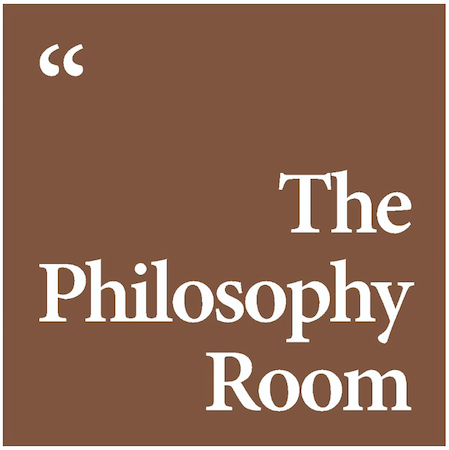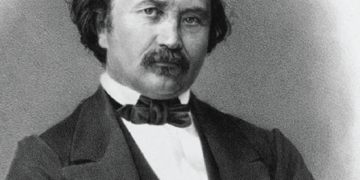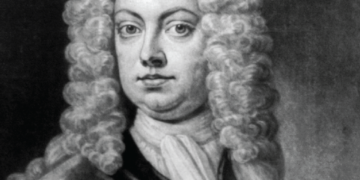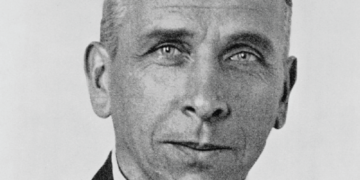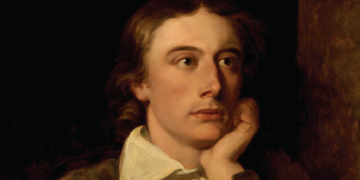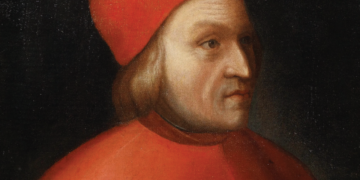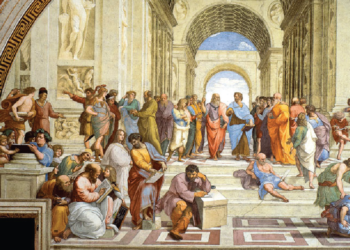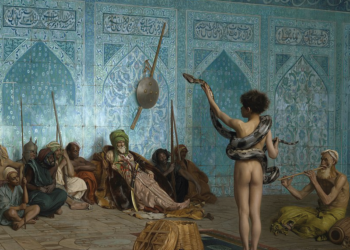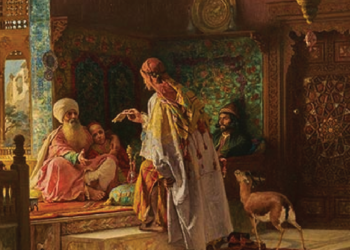Al-Akhtal
1) His Biography
Al-Akhtal, born Ghiyath ibn Ghawth al-Taghlibi around 640 CE, was a prominent Arab poet of the early Umayyad period, renowned for his panegyrics and tribal pride. He hailed from the Taghlib tribe, a powerful Christian Arab tribe in northern Mesopotamia. Unlike many of his contemporaries who converted to Islam, Al-Akhtal remained a Christian throughout his life, which set him apart in the largely Islamic milieu of the Umayyad court. His Christian background did not hinder his prominence; rather, it became a unique facet of his identity that contributed to the richness of his poetic voice.
From an early age, Al-Akhtal displayed remarkable talent in poetry, particularly in the traditional form of qasida, or ode. His early works were deeply tribal in nature, reflecting the pre-Islamic tradition of boasting about one’s lineage and mocking rival tribes. His tribal affiliations were more than mere poetic themes; they also influenced his alliances and patronage. The Taghlib’s longstanding rivalry with the Qaysi tribes was a recurring theme in his verse, and he used poetry as a means of both asserting his tribe’s superiority and preserving its reputation.
Al-Akhtal gained prominence under the Umayyad caliph Muʿawiya I, but it was under Caliph Abd al-Malik ibn Marwan that he reached the peak of his influence. Recognised for his skill in crafting eloquent praise, he became the official court poet and was handsomely rewarded for his services. His relationship with the Umayyad elite was based on mutual benefit: he provided them with verse that glorified their reign, while they gave him prestige and protection. His boldness in expression and unapologetic pride in his Christian faith, however, sometimes brought him into tension with Islamic authorities.
His rivalry with other poets, notably Jarir and al-Farazdaq, became legendary in Arabic literary history. The poetic duels among these figures, known as naqā’id, involved sharp wit, biting satire, and personal attacks, and are considered a high point in the classical Arabic literary tradition. Al-Akhtal’s contributions to these contests displayed not only his poetic talent but also his mastery of the Arabic language and his strategic use of rhetoric. These poetic exchanges were more than entertainment; they served as vehicles for political and tribal commentary.
Despite his high standing, Al-Akhtal’s career was not free of controversy. His poetry was sometimes criticised for being overly coarse or offensive, and his open Christian identity occasionally provoked resentment. Yet, his talent shielded him from severe repercussions, and his position at court remained largely secure until his death. His fearlessness in addressing controversial topics, including religious tension and tribal disputes, earned him both admirers and detractors.
Al-Akhtal continued to compose poetry until his death around 710 CE. His influence extended beyond his own lifetime, shaping the conventions of Arabic praise poetry and court panegyric for generations. His poems were preserved in various manuscripts and recited in literary gatherings, contributing to the development of Arabic poetic form during the early Islamic period. His ability to blend classical poetic forms with contemporary political concerns marked him as a significant transitional figure between pre-Islamic and Islamic literature.
His legacy as one of the greatest Umayyad-era poets endures in the annals of Arabic literature. Although his Christian background and sharp tongue were sources of contention, his work is remembered for its elegance, precision, and power. His biography reflects the complexities of religious and political identity in early Islamic society, and his poetry offers valuable insight into the cultural dynamics of his time.
2) Main Works
Panegyrics to the Umayyad Caliphs
These are a series of qasā’id (odes) composed in praise of the Umayyad caliphs, particularly Muʿawiya I and Abd al-Malik ibn Marwan. They extol the rulers’ power, legitimacy, military victories, and divine favour. The poems served a political purpose, reinforcing the caliphate’s authority through eloquent and formalised language.
Naqā’id with Jarir and al-Farazdaq
This body of work includes satirical poetic duels (naqā’id) between Al-Akhtal and his major rivals, Jarir and al-Farazdaq. These poems were characterised by wit, insult, tribal boasting, and rebuttal. Al-Akhtal often used these exchanges to assert the superiority of his Taghlib tribe and to undermine his opponents’ tribal and poetic reputations.
Tribal Boasts and Lampoons
These poems were directed at rival Arab tribes, particularly those affiliated with Jarir’s Tamim tribe. Al-Akhtal employed vivid imagery and biting sarcasm to exalt the Taghlib and diminish the lineage, culture, and accomplishments of others. These compositions preserved aspects of pre-Islamic poetic traditions in a new political context.
Elegies and Lamentations
Al-Akhtal wrote elegies (marthiyyāt) mourning the deaths of notable Taghlib figures or Umayyad dignitaries. These poems often contained reflections on mortality, loyalty, and the loss of noble virtues, and were highly regarded for their emotional depth and rhetorical strength.
Love and Wine Poetry
Though less central to his reputation, some of Al-Akhtal’s poems delve into the themes of love and wine (khamriyyāt), often expressing sensual pleasures and moments of revelry. These poems reflect the secular and hedonistic aspects of elite Umayyad society, diverging from religious or tribal themes.
Poems on Christian Identity
A handful of Al-Akhtal’s poems subtly assert his Christian faith and defend it against criticism. While not overtly theological, these verses affirm his pride in his religious heritage and occasionally offer veiled critiques of Islamic orthodoxy or the pressures of conversion.
Collected Dīwān (Poetic Corpus)
Al-Akhtal’s Dīwān, compiled posthumously, brings together his major odes, elegies, and satirical poems. It serves as a comprehensive collection that showcases the breadth of his work, from formal court praise to polemical exchanges. The Dīwān remains a vital source for understanding the literary and political culture of the Umayyad period.
3) Main Themes
Tribal Pride and Lineage
Al-Akhtal’s poetry is deeply rooted in tribal identity, particularly the glorification of his own tribe, the Taghlib. He often extolled their bravery, honour, and noble lineage, using poetry as a means to assert their superiority over rival tribes. This theme continues the pre-Islamic tradition of fakhr (boasting), and it served as both cultural affirmation and political commentary.
Political Praise and Loyalty
A significant portion of Al-Akhtal’s verse is dedicated to panegyric poetry, especially in service to the Umayyad caliphs. These poems celebrate the might, leadership, and divine right of rulers like Muʿawiya I and Abd al-Malik ibn Marwan. Through elaborate praise, Al-Akhtal reinforced the legitimacy of the Umayyad dynasty, securing his own role as an official court poet.
Satire and Invective (Hijā’)
Al-Akhtal was a master of satirical poetry, using invective to ridicule his enemies and rivals. His polemical exchanges with poets such as Jarir and al-Farazdaq are laced with biting humour, personal attacks, and tribal insults. These poems reveal his sharp wit and deep understanding of rhetorical strategy, and they played a central role in the competitive poetic culture of his time.
Religious Identity and Defiance
Although Al-Akhtal lived during the rise of Islam, he remained a Christian and occasionally addressed his religious identity in his poetry. His verse contains veiled defences of Christianity and subtle critiques of religious pressure to conform. His faith is not central in all his works but is present as a recurring motif of proud defiance and individuality.
Elegy and Mourning
Al-Akhtal composed several marthiyyāt (elegies), expressing grief for the death of notable individuals. These poems are marked by emotional depth, exploring themes of loss, honour, and the transience of life. They offer a more reflective and human dimension to his otherwise combative and boastful corpus.
Court Culture and Flattery
His work often reflects the refined, hierarchical culture of the Umayyad court. Poetry was not merely art, but a form of influence and political negotiation. Through his praise, Al-Akhtal positioned himself as both a cultural authority and a beneficiary of courtly patronage. His poems illustrate the symbiosis between poet and ruler in the early Islamic empire.
Love, Wine, and Worldly Pleasures
Some of Al-Akhtal’s poetry celebrates sensual pleasures, particularly wine-drinking and romantic experiences. These themes echo the secular and luxurious lifestyle of the Umayyad elite, portraying the enjoyment of life’s physical delights without concern for spiritual restraint. Such themes often stood in contrast to the more ascetic tones found in Islamic piety.
Language and Eloquence
Across his works, Al-Akhtal exhibits a profound mastery of classical Arabic, employing complex structures, refined diction, and rich metaphor. His poems often draw attention to their own artistry, positioning the poet as a skilled craftsman whose words could elevate or ruin reputations. This meta-poetic theme enhances the sense of poetry as both art and weapon.
4) Al-Akhtal as a Poet
Al-Akhtal’s reputation as a poet rests on his exceptional command of classical Arabic, his ability to adapt pre-Islamic poetic forms to the needs of a changing political world, and his fearless use of satire and praise. He emerged during a time when poetry held immense social and political power, and he leveraged his talent to secure a unique place at the Umayyad court. His verses, though often crafted for political patrons, did not shy away from personal expression, tribal identity, or bold religious positioning, demonstrating his multifaceted literary personality.
Stylistically, Al-Akhtal was a master of the qasida, a traditional Arabic ode composed of elaborate monorhyme and carefully structured themes. He employed vivid imagery, rhythmic precision, and a sophisticated lexicon to create verse that was both ornate and forceful. His ability to blend the conventions of the jahiliyyah (pre-Islamic) poetic tradition with the realities of the Islamic empire made him a transitional figure, bridging two literary epochs. His poems preserved the essence of Bedouin themes such as honour, lineage, and bravery, while also serving the purposes of empire-building and courtly flattery.
A major aspect of Al-Akhtal’s poetic identity was his position as a Christian Arab within a predominantly Muslim society. Unlike many poets of the Umayyad court, he did not convert to Islam, and his Christianity informed certain perspectives in his poetry. This religious divergence did not inhibit his success; rather, it accentuated his uniqueness and underlined the cosmopolitan nature of the Umayyad regime. His poems occasionally carried a tone of religious defiance, yet they remained politically palatable due to his literary brilliance and his usefulness to the caliphs.
Al-Akhtal’s invective poetry, especially his participation in poetic duels with Jarir and al-Farazdaq, stands as a testament to his sharp wit and strategic intelligence. These naqā’id poems involved direct verbal combat, with each poet responding to the other’s insult in a new poem. In these exchanges, Al-Akhtal revealed not only his linguistic virtuosity but also his deep understanding of tribal history, social norms, and personal honour. His capacity to wield poetry as a social weapon reflected the enduring role of the poet as both entertainer and critic.
At the same time, Al-Akhtal’s panegyrics to the Umayyad caliphs were masterclasses in courtly praise. He elevated rulers through metaphor, allusion, and appeals to divine legitimacy, contributing to the ideological consolidation of Umayyad rule. These poems went beyond mere flattery; they helped shape a narrative of dynastic glory and Arab supremacy. In doing so, Al-Akhtal contributed to the evolving role of the poet as a political instrument, securing state favour in exchange for literary loyalty.
His legacy also lies in the enduring influence of his diwan, which was studied and memorised by generations of Arab poets and scholars. His verses served as models of eloquence and formal excellence in classical Arabic literature. Many later critics, including those of the Abbasid period, acknowledged his role in perfecting the art of panegyric and reviving tribal invective in new cultural contexts.
5) His Legacy
Al-Akhtal’s legacy is firmly rooted in his status as one of the most accomplished and influential poets of the Umayyad period. His work helped define the contours of Arabic court poetry at a time when the Islamic empire was expanding and consolidating its cultural identity. By combining pre-Islamic poetic forms with the emerging needs of a centralised Arab-Islamic state, he played a pivotal role in shaping the literary expression of power, authority, and tribal allegiance. His lasting influence can be traced through the generations of poets and literary critics who engaged with his work both as a model and a point of contention.
One of the most distinctive aspects of his legacy is his success in maintaining a prominent position at the heart of Umayyad court life despite his Christian faith. This illustrates both his personal resilience and the relatively pluralistic culture of the early Islamic caliphate, particularly under the Umayyads. Al-Akhtal’s ability to navigate religious difference while enjoying the favour of Muslim rulers speaks to the complex social fabric of the time. It also helped preserve a unique Christian voice within the Arabic poetic tradition, one that is rarely found in later Islamic literary history.
Al-Akhtal’s poetic duels with contemporaries like Jarir and al-Farazdaq became legendary and were preserved as part of Arabic literary heritage. These rivalries were more than displays of wit; they encapsulated broader tribal, political, and religious tensions of the period. His participation in these poetic contests showcased the versatility of Arabic as a vehicle for satire, mockery, and rhetorical argument, ensuring that invective poetry (hijā’) remained a respected genre. His name became synonymous with the art of insult and rebuttal, setting a high standard for future practitioners of the form.
His diwan, though not extensive by later standards, has been carefully preserved and studied by scholars across centuries. The richness of his language, the structure of his verse, and the depth of his allusions made his work a touchstone for later poets and philologists. In particular, the Abbasid-era literary scholars valued his mastery of the qasida form and included his verses in anthologies and commentaries. This ensured that Al-Akhtal remained part of the classical canon, influencing both the content and pedagogy of Arabic literary education.
Al-Akhtal’s work also contributed to the political use of poetry as propaganda, laying the groundwork for court poets in both the Umayyad and Abbasid periods. By transforming poetic praise into a refined art of statecraft, he helped elevate the status of the poet from wandering tribal bard to salaried court functionary. This development had profound implications for Arabic literature, as it solidified the bond between poetry and political power that would endure throughout the Islamic golden age.
His legacy is also evident in the broader preservation of tribal memory and identity through poetry. In an age of rapid cultural and religious change, Al-Akhtal’s verse acted as a vessel for the values and histories of the Taghlib tribe. This not only cemented his role as a guardian of tribal honour but also ensured that a distinct pre-Islamic cultural lineage survived within the Islamic narrative.
Ultimately, Al-Akhtal’s contribution lies in his exceptional adaptability and literary innovation. He embodied the transitional nature of his time—between tribalism and empire, pagan heritage and monotheism, oral tradition and written preservation. His poetry remains a window into the political, social, and linguistic dynamics of the early Islamic world, and his name continues to evoke admiration among students of classical Arabic literature.
